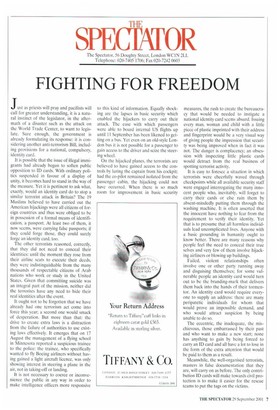SPECIATOR
The Spectator, 56 Doughty Street, London WC1N 2LL Telephone: 020-7405 1706; Fax 020-7242 0603
FIGHTING FOR FREEDOM
Just as priests will pray and pacifists will call for greater understanding, it is a natural instinct of the legislator, in the aftermath of a disaster such as the attack on the World Trade Center, to want to legislate. Sure enough, the government is already formulating its response: it is considering another anti-terrorism Bill, including provisions for a national, compulsory, identity card.
It is possible that the issue of illegal immigrants had already begun to soften public opposition to ID cards. With ordinary politics suspended in favour of a display of unity, it becomes hard to stand in the way of the measure. Yet it is pertinent to ask what, exactly, would an identity card do to stop a similar terrorist attack in Britain? The 19 Muslims believed to have carried out the American hijackings were all citizens of foreign countries and thus were obliged to be in possession of a formal means of identification, a passport. At least two of them, it now seems, were carrying false passports; if they could forge those, they could surely forge an identity card, too.
The other terrorists reasoned, correctly, that they did not need to conceal their identities: until the moment they rose from their airline seats to execute their deeds, they were indistinguishable from the many thousands of respectable citizens of Arab nations who work or study in the United States. Given that committing suicide was an integral part of the mission, neither did the terrorists have any need to hide their real identities after the event.
It ought not to be forgotten that we have already had one terrorism act come into force this year; a second one would smack of desperation. But more than that: the drive to create extra laws is a distraction from the failure of authorities to use existing laws effectively. It emerges that on 17 August the management of a flying school in Minnesota reported a suspicious trainee to the police: the trainee, who specifically wanted to fly Boeing airliners without having gained a light aircraft licence, was only showing interest in steering a plane in the air, not in taking-off or landing.
It is not necessary to coerce or inconvenience the public in any way in order to make intelligence officers more responsive to this kind of information. Equally shocking are the lapses in basic security which enabled the hijackers to carry out their attack. The ease with which passengers were able to board internal US flights up until 11 September has been likened to getting on a bus. Yet even on an old-style London bus it is not possible for a passenger to gain access to the driver and seize the steering wheel.
On the hijacked planes, the terrorists are believed to have gained access to the controls by luring the captain from his cockpit; had the co-pilot remained isolated from the passenger cabin, the hijacking could not have occurred. When there is so much room for improvement in basic security measures, the rush to create the bureaucracy that would be needed to instigate a national identity card seems absurd. Issuing every man, woman and child with a little piece of plastic imprinted with their address and fingerprint would be a very visual way of giving people the impression that security was being improved when in fact it was not. The danger is complacency; an obsession with inspecting little plastic cards would detract from the real business of spotting terrorist activity.
It is easy to foresee a situation in which terrorists were cheerfully waved through checkpoints while all available security staff were engaged interrogating the many innocent people who, inevitably, will forget to carry their cards or else ruin them by absent-mindedly putting them through the washing machine. It is often asserted that the innocent have nothing to fear from the requirement to verify their identity. Yet that is to presume that all harmless individuals lead uncomplicated lives. Anyone with a basic grounding in humanity ought to know better. There are many reasons why people feel the need to conceal their true selves and very few of them involve hijacking airliners or blowing up buildings.
Failed, violent relationships often involve one or other party running away and disguising themselves; for some vulnerable people an identity card would turn out to be the branding-mark that delivers them back into the hands of their tormentor. An identity card would require everyone to supply an address: there are many peripatetic individuals for whom that would prove an impossible demand, and who would attract suspicion by being unable to do so.
The eccentric, the inadequate, the mischievous, those embarrassed by their past and who want to make a new start; none has anything to gain by being forced to carry an ID card and all have a lot to lose in the form of the extra attention that would be paid to them as a result.
Meanwhile, the well-organised terrorists, masters in false documentation that they are, will carry on as before. The only contribution ID cards will make towards civil protection is to make it easier for the rescue teams to put the tags on the victims.






































































 Previous page
Previous page